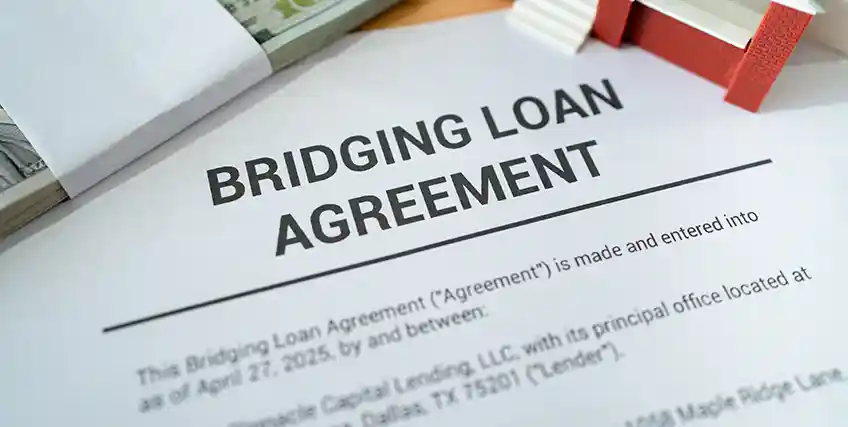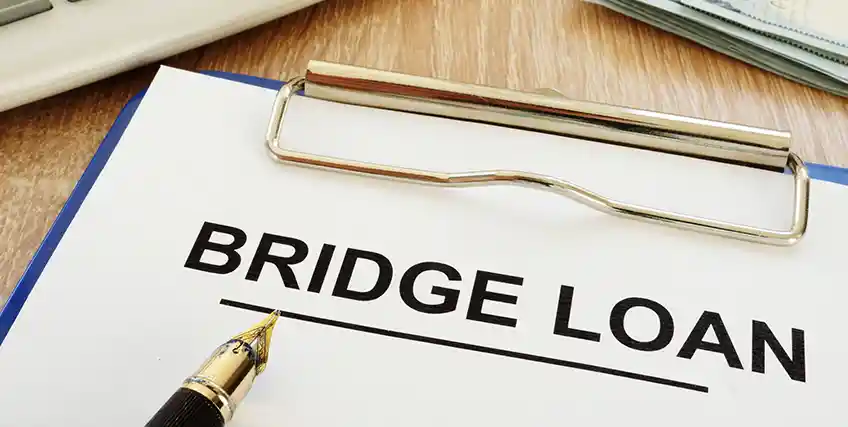Bridge Loans for Real Estate: A Short-Term Funding Guide
July 21, 2025 | Last Updated on: July 21, 2025

In competitive markets where desirable commercial properties are scooped up within days, business owners can’t afford to wait for traditional mortgages to close. That’s where bridge loans for real estate come into play.
Designed to help businesses and investors act quickly, bridge loans are a type of short-term loan that fills the gap between buying a new property and securing long-term financing. They allow home buyers, real estate investors, and small business owners to outmaneuver slower-moving competitors. Whether you're purchasing a new house, expanding your commercial footprint, or refinancing to avoid a sale contingency, a short-term bridge loan can be the lifeline that keeps your deal alive.
Unlike traditional mortgages, bridge financing offers faster approval, more flexible terms, and freedom from delays caused by underwriting or PMI hurdles. With higher interest rates but quicker access to funds, these loans are a strategic tool for any entrepreneur looking to close fast.
What Are Bridge Loans for Real Estate?
Bridge loans for real estate are temporary loans that help borrowers finance the purchase of a new property before selling their existing home or securing permanent financing. Essentially, they “bridge” the financial gap during transitions.
These loans are commonly used in both residential and commercial real estate to prevent delays in acquisitions. Unlike traditional loans, which may take 30–60 days to fund, bridge loans often close in under two weeks. That speed allows borrowers to act on time-sensitive opportunities.
Let’s say you’re buying new office space. Your equity is tied up in your current property, and the bank’s loan process is crawling. A short-term bridge loan provides you with the lump sum cash needed to make a down payment, secure the deal, and finalize your home purchase or commercial transaction while waiting for your current home or building to sell.
Bridge loans typically have durations of 6–18 months and come with higher interest rates than conventional loans due to their short-term nature. Payments are often interest-only, helping you maintain cash flow. Loan amounts depend on the borrower’s credit score, home’s value, and loan-to-value ratio (LTV). Lenders often prefer a clear repayment or refinance strategy.
Bridge loans differ from home equity loans and HELOCs because they’re designed for rapid deployment and repayment, not long-term borrowing.
When Businesses Rely on Bridge Loans
In commercial real estate, timing often determines opportunities. Here are five business scenarios where bridge loans for real estate help entrepreneurs close faster and smarter:
Quick Commercial Property Acquisition
In competitive property markets, opportunities disappear fast. A bridge loan lets you secure real estate quickly before another buyer wins the bid. These loans help cover down payment, closing costs, and even inspection fees while you line up long-term financing.
Fix-and-Flip or Renovation Investments
Real estate investors use bridge loans to buy, renovate, and resell properties. The short loan term matches the fast-paced fix-and-flip timeline, with repayment covered by the sale of the updated asset.
Construction or Tenant Build-Outs
For construction projects or tenant improvements, delays in SBA funding or mortgage loan approvals can stall progress. Bridge loans offer rapid access to capital so you can start immediately.
Retail or Franchise Expansion
A business owner may need to grab a new retail lease or franchise location before someone else does. A short-term bridge loan can fund leasehold improvements or down payment while long-term financing is in process.
Temporary Relief During Refinancing Delays
Sometimes a new mortgage or refinance takes longer than expected. In such cases, a bridge loan can provide short-term liquidity to keep the deal alive and maintain business continuity.
Bridge Loan Requirements: What You Need to Qualify
When it comes to speed, not all financing options function in the same way. To qualify for bridge loans for real estate, business owners must meet specific benchmarks that ensure repayment and minimize risk for lenders.
Strong Exit Strategy
While evaluating a loan application, every lender wants to see how you can pay it back. That's why you need to have a detailed and well-documented exit plan. It can include strategies like selling your current home, securing long-term financing, or even refinancing into a new mortgage. A strong exit plan gives confidence to underwriters that the loan won't default. And it will go a long way to bolster confidence in your application.
Good Credit Score and Manageable DTI
If you're thinking of applying for a physical therapy business loan, ensure that your credit score is above 660 and you have a healthy debt-to-income ratio (DTI). Lenders are definitely going to check that. Moreover, your existing liabilities will come into play too. Think of your existing mortgage loan, credit card balances and other obligations - all of them will affect your loan approval. So, you need to have a strong financial profile to secure lower bridge loan interest rates.
Sufficient Home Equity or Collateral
Bridge lenders evaluate your home’s value, loan-to-value ratio (LTV), and any existing liens. A strong equity position in your current home or commercial building can lead to better terms and a smoother closing.
Reliable Business or Project Financials
Whether you’re flipping a building or expanding your operations, lenders will want to see documents like business tax returns, rent rolls, or asset statements. This helps them assess cash flow, future repayment, and risk exposure.
What to Expect: Bridge Loan Interest Rates and Fees
Before you jump into the loan process, you need to understand that it's not just about the speed when it comes to bridge loans for real estate. These loans have their own unique costs that business owners must bear. If you have a clear understanding of the pricing structure of the loan, it can help you make an informed decision whether it’s the right short-term strategy for your business.
Borrowers should expect origination fees, legal costs, closing costs, and sometimes prepayment penalties. Many bridge loans also offer interest-only payments, which help manage monthly payments and preserve cash flow until the home sells or refinancing occurs.
Unlike a first mortgage or FHA loan, bridge financing isn’t heavily regulated and varies by lender. This means shopping around is essential to get favorable loan terms and avoid predatory conditions.
If your loan amount and business plan are solid and you can repay within 6–18 months, these loans can serve as a springboard to long-term success.
Pros and Cons of Bridge Loans for Real Estate
All financing products come with their own benefits and drawbacks. To make informed decisions about securing bridge loans for real estate, it’s recommended that you understand its advantages and disadvantages to avoid any unwanted surprise in the future.
Pros of Bridge Loans for Real Estate
Speed and Flexibility
Bridge loans are built for fast approvals and quick closings, often within 10 days. That speed helps borrowers beat competitors and act without delay when a promising opportunity arises.
Strategic Cash Flow
Because many bridge loans offer interest-only payments, borrowers can better manage their monthly payments and preserve working capital until the home sells or permanent financing is secured.
No Sale Contingency
Buy a new home or commercial building without waiting to sell your existing home. This opens doors to better properties, tenants, and business opportunities that would otherwise be missed.
Cons of Bridge Loans for Real Estate
Higher Interest Rates
You’ll likely face higher interest rates than a standard mortgage or home equity loan. Rates often reflect the short-term nature and risk to the lender.
Short Repayment Window
With most bridge loan terms lasting just 6 to 18 months, there's little room for delays. If your home sale or refinance falls through, you may face default risks or refinancing challenges.
Stringent Qualification
From credit score checks to verifying your repayment strategy, lenders set strict bridge loan requirements. Without strong documentation, approval can be tough.
How to Apply for a Bridge Loan the Smart Way
Bridge loans for real estate move fast, and so should your application prep. Here’s a breakdown of what it takes to apply quickly and increase your chances of approval.
Gather All Your Documentation
Before reaching out to a lender, compile essential paperwork: property appraisal, business tax returns, profit/loss statements, and current mortgage details. This allows the lender to evaluate your repayment capacity, assess cash flow, and calculate your loan amount eligibility.
Highlight a Clear Exit Strategy
Lenders need confidence that they’ll be repaid. Whether it’s a pending home sale, refinance, or new mortgage, show exactly how and when you’ll repay the loan. Include details like sale timelines, buyer offers, or signed purchase contracts.
Choose the Right Lender
Not all bridge loan lenders are equal. Look for lenders experienced in real estate deals and short-term products. Banks, private investors, or credit unions may offer competitive rates depending on your credit score and project timeline.
Be Ready to Move Fast
A huge advantage of bridge loans for real estate is speed. But that only happens if you act fast on your end too. Respond promptly to lender inquiries and get all your paperwork ready to go.
You may also like: Bridge Financing in Real Estate Might Be Your Best Bet in 2025
Conclusion
Bridge loans for real estate can be a game-changing tool but only when used strategically. They're ideal for business owners looking to move quickly, capitalize on limited-time property deals, or bridge the gap during financing delays.
If you have strong equity in your current home or commercial asset, a reliable repayment strategy, and a qualified credit score, this short-term financing option could unlock major growth opportunities. But remember: the costs, timelines, and risks, such as higher interest rates or short loan terms, must be weighed carefully.
Use these loans as a bridge, not a crutch. They work best when paired with a clear exit strategy and backed by expert financial planning. Done right, they help business owners close deals with confidence and transition smoothly into long-term financing.
And if you're navigating a hot market, bridge loans for real estate may be your fastest path to ownership and leverage before competitors catch up.
FAQs About Bridge Loans for Real Estate
1. What are bridge loans for real estate used for?
They’re used to finance the purchase of a new property while waiting for the sale of an existing one or long-term financing to come through.
2. How long does a short-term bridge loan typically last?
Most short-term bridge loans last 6 to 18 months, making them ideal for time-sensitive real estate transactions.
3. Are bridge loan interest rates higher than regular mortgage rates?
Bridge loan interest rates are usually higher due to the short term and increased risk taken on by the lender.
4. Can I use a bridge loan for business property?
Absolutely. Many business owners use bridge loans for real estate acquisitions, build-outs, or tenant improvements.
5. Is a bridge loan for real estate worth it for small business owners?
A bridge loan for real estate can be worth it to ensure timely closings.
Frequent searches leading to this page
Term Loans are made by Itria Ventures LLC or Cross River Bank, Member FDIC. This is not a deposit product. California residents: Itria Ventures LLC is licensed by the Department of Financial Protection and Innovation. Loans are made or arranged pursuant to California Financing Law License # 60DBO-35839




